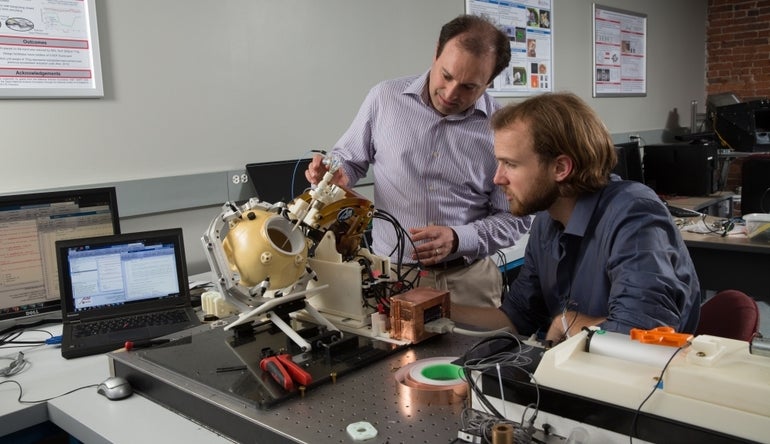Researchers at Worcester Polytechnic Institute have received a five-year, $3.5-million grant from the National Institutes of Health to continue development on a robotic system that can destroy brain tumors.
The system is operated within an MRI scanner and delivers a minimally invasive probe to destroy metastatic brain tumors with high-intensity therapeutic ultrasound.
The grant is the second major NIH award for the system and will enable the research team — including researches from Albany Medical College, GE Global Research and Acoustic MedSystems Inc. of Illinois — to model the behavior of the ultrasound ablation system, implement thermal monitoring to provide real time feedback, optimize and verify the system’s’ effectiveness and certify its readiness for clinical trials.
The research team is led by principal investigators Gregory Fischer, associate professor of mechanical engineering and robotics engineering at WPI and director of the Automation and Interventional Medicine Laboratory, and Julie Pilitsis, chair of the Department of Neuroscience and Experimental Therapeutics and professor of neurosurgery at Albany Medical College.
Brain metastases occur when cancers in other areas of the body spread to the brain. Currently, the only treatment options are chemotherapy, radiation and surgery, all of which have limited success and can be dangerous.
The system is designed as an alternative approach and uses a thin two-millimeter probe that can be inserted into the brain through a small hole drilled in the skull and placed within the tumor. High-intensity ultrasound energy that can kill tumors will be delivered to the tumor. The heat generated from the probe can be monitored on the MRI scanner to help protect other areas of the brain.
The WPI team, lead by Fischer, is developing the robotic system capable of operating within an MRI scanner and based on real-time MRI scans rather than pre-operative images.
“Our system is designed to provide very precise, closed-loop control,” Fischer said in a press relese. “We will use live MRI images and thermal imaging to control the pattern of the ablation and monitor and adjust it in real-time to confine the thermal effects to the area within the tumor boundaries and to ensure that we are maximizing the odds that we are removing the entire tumor, while minimizing the chances of damaging non-malignant tissue.”

